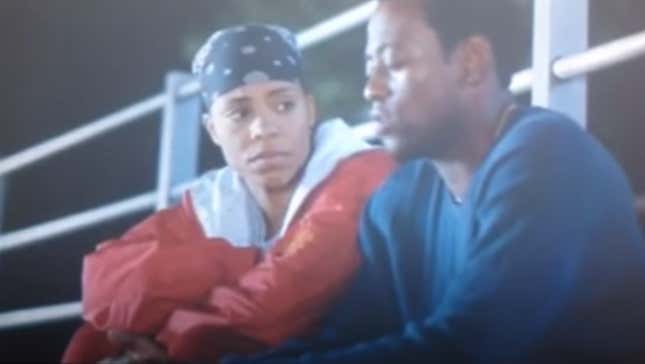
Imagine being able to reflect and reminisce about a passion project about your own life 20 years later with tens of thousands of fans.
Well, that’s what writer-director Gina Prince-Bythewood got to do on Tuesday night when she and BET hosted a live-tweet watch party of Love & Basketball to celebrate the beloved film’s 20th anniversary (the film’s original theatrical release was on April 21, 2000).
Since this year marks such a monumental anniversary, I figured this was as good a time as any to rehash old shit. Namely, readdressing whether or not Monica (Sanaa Lathan) should’ve broken her curfew to stay with Quincy (Omar Epps) for moral support.
If you recall correctly, Quincy had just found out his father—whom he placed on a pedestal—had cheated on his mother and it rocked his world. As such, he went to his girlfriend Monica to talk it through. However, Monica, a promising player on the women’s college basketball team, was on a strict curfew schedule and, of course, wanted to maintain a good impression and be able to continue to play in the games. So, she asked Quincy if they could talk in her dorm room instead of the bleachers, but Quincy refused, noting he’d rather talk on the bleachers without the risk and hassle of having to “run into anybody” during such a sensitive time in his life. When Monica attempted to explain the risk and offer a compromise, Quincy got upset (well, passive-aggressively) and clearly felt she wasn’t supporting him the way she should. Fuckboy shenanigans and a subsequent breakup ensued, thereafter.
Here’s the replay of the scene:
My Stance: Quincy was out of line. First of all, he didn’t actually give a fuck about staying at the bleachers, he was projecting his hurt and distrust of relationships onto Monica—because, let’s be honest, Monica could’ve offered the exact same emotional support in her dorm room that she did at the bleachers. It’s easy for Quincy to say that Monica was putting basketball before everything else when his burgeoning basketball career was being offered to him on a silver platter while Monica had to work twice as hard to even get on the starting lineup. What if the roles were reversed? The same man who decided to enter the NBA draft without telling her out of spite would’ve certainly asked her to understand if he had to adjust his schedule for practice or a major game. Monica may have been raised by basketball, but she certainly wasn’t the only one. They had that in common. Monica wasn’t a bad girlfriend in that instance, point, blank, and period. Let’s fight.
Naturally, Prince-Bythewood is fine to live within the grey area since she created these characters who are clearly close to her heart, thus she can empathize with each.
Honestly, this is the beauty of film and the impact these well-crafted characters can have on the viewer. It’s been two decades and this is still a point of passionate contention, especially among black folks. And I mean, if that shit didn’t happen, we wouldn’t have gotten the epic “double or nothing” scene with one of the best soundtrack choices known to man (shout-out to Meshell Ndegeocello).
During the live-tweet session, Prince-Bythewood shared some great behind-the-scenes “fun facts.”
She also shared her personal idea “spark” for the film, in a recent interview with The Hollywood Reporter:
Ironically, it had nothing to do with basketball. The kernel of the idea was that I wanted to make a black When Harry Met Sally. I love that film, and there was a dearth or nonexistence of love stories made with black characters. It was something that I wanted to see reflected; I wanted to see myself reflected. So, the first thing I asked was, “Is being friends the best way to start a healthy relationship?” From that kernel, I started to think about what story I wanted to tell, and I’d been taught in film school that your first film should be personal—a story only you could tell. So, I thought about my life and the things I loved. I also wanted to tell a story that put into the world that women could have both—love and career. So, all those things together were the spark.
I love that she said this film is akin to When Harry Met Sally, one of my favorite films, but that similarity is definitely something that stuck out to me when watching this. Navigating that complicated friendship dynamic was something I could wholly relate to and I appreciated getting to see black characters within that space. Here’s to 20 more years of reminiscing about this wonderful film that’ll always hold a special place in my heart.
So, let’s argue and fight in the comments! Oh, and if you have extra free time, get into Prince-Bythewood’s Twitter timeline and scroll through all the fun facts she provided on Tuesday night. If you’re a fan of the film (which I imagine you are if you’ve read up to this point), you’ll enjoy these free nuggets.

